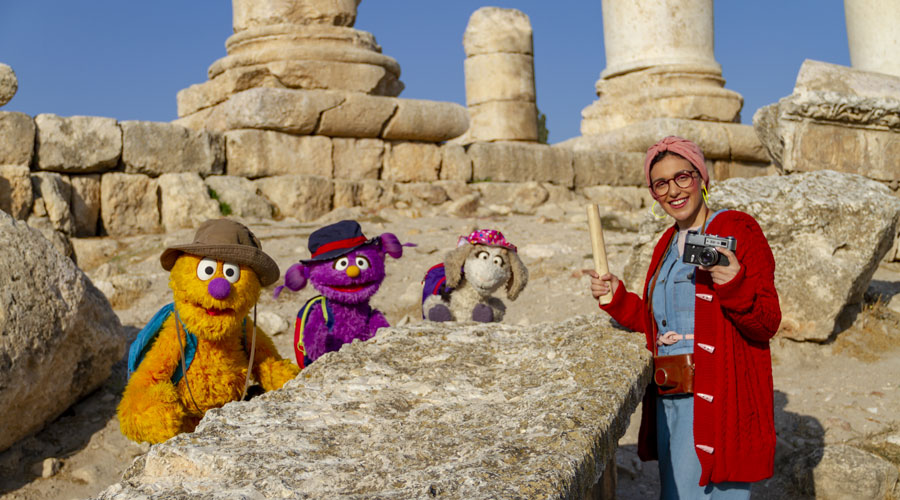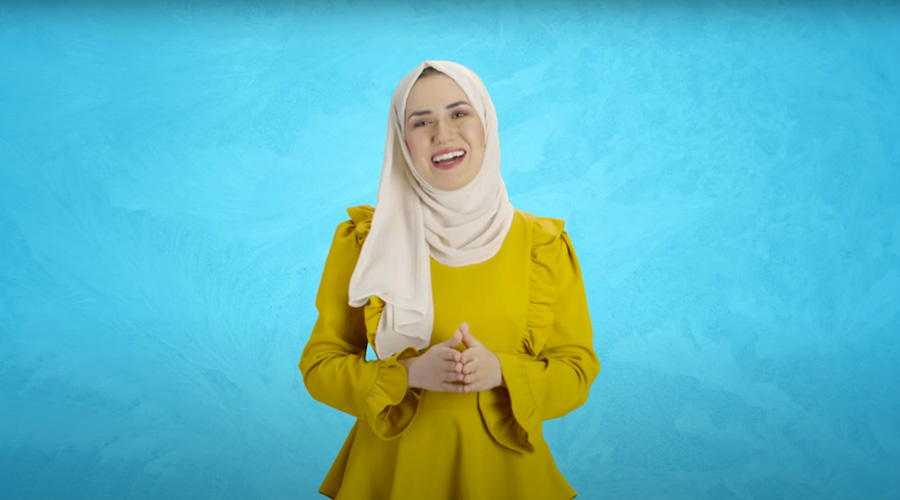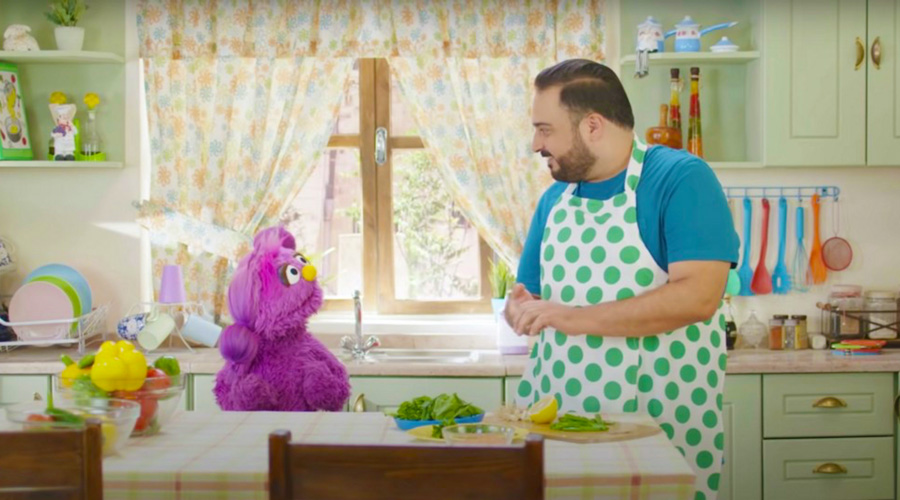Sesame Workshop used formative research to help provide parents information on child development with trusted experts.
Sesame Workshop used formative research to help provide parents information on child development with trusted experts. Since Sesame Workshop’s inception, formative research has always been at the heart of our approach. Sesame Street was the first children’s show to use research to inform production, and formative research has been integral to building Ahlan Simsim, our program supporting the early childhood development (ECD) needs of families affected by crisis and conflict in the Middle East, in partnership with the International Rescue Committee.
Formative research helps us learn about our audiences; it brings the voice of the child and the family into the creative and production process and helps us answer questions about appeal, comprehension, and utility. As we develop content for television or digital use, our research, production, and education teams work together to develop and test prototypes to inform what children will see on screen.
With support from the GSMA Mobile for Humanitarian Innovation Fund*, we recently embarked on a formative study unlike any in Sesame Workshop’s 51 years, enabling us to develop and test a series of mobile-optimized Ahlan Simsim videos to support the parents and caregivers of children in Jordan, Lebanon, Iraq, and Syria.

Photo credit: Mohamed Ewiss / Sesame Workshop
Basma, Jad, and Ma’zooza explore with a new friend on Season 3 of Ahlan Simsim.
What We Needed to Know
We wanted to design the videos to provide caregivers with important information and model behaviors to help them support their children’s social-emotional development. Our approach in creating the videos was shaped through a series of needs assessments, previous formative studies, expert advisories, and curriculum workshops with local and global experts. We needed to know who parents and caregivers saw as the best messengers to share information on their child’s development and what they saw as the key attributes of a trusted messenger.
How We Did It
We recognized that we needed to adapt our traditional approach to formative research to help us answer these questions. To understand what messages help children grasp an episode’s educational goals, we typically test a variety of messages delivered by our characters. But for this content, we knew from experience that if parents and caregivers didn’t trust the messenger, they wouldn’t engage in the first place. What makes this formative research unique is that we decided to test the same message delivered by different messengers with different qualities in order to determine who caregivers would be most likely to trust and listen to.
With a draft script focused on the importance of play to children’s development, we worked with our local production partner Jordan Pioneers to create three versions of the same five-minute script, each with a different messenger: a caregiver, a social worker, and a doctor.

One of the trusted messengers, a social worker, delivers a message on brain development in early childhood.
Given COVID-19 restrictions, we worked with our research partner Radius Global to test the videos through online focus groups with displaced Syrian families living in Jordan and Lebanon. All participants had at least one child aged 4–6 and had previously watched Season 1 of Ahlan Simsim.
What We Learned
Overall, parents and caregivers shared that they place a good deal of trust in Sesame content, and that many of them watch our Ahlan Simsim show with their kids and talk about the show’s lessons during and after the show. Our findings also reinforced that displacement has been difficult for the whole family—adults and children alike. We also found that the economic and social situations in Lebanon and Jordan have created further hardship, as some parents work multiple jobs and have limited time to spend with family.
Parents find it hard to relate to children and raise them under uncertainties and social challenges that they did not experience, like making new friends in a new environment, xenophobia, bullying, anger, and now COVID-19. We learned that parents often seek advice from family members and other parents close to their own age, but they also want more advanced guidance from experts.
In general, parents shared that an effective trusted messenger must:
- Appeal to children, even if the video is for parents
- Know the topic enough to speak about it with clarity, confidence, and ease
- Provide clear examples and evidence of expertise
- Demonstrate a calm, humble, and patient attitude
- Engage in positive, encouraging body language
- Make direct eye contact
- Wear casual, joyful, colorful, and culturally appropriate clothing
After watching the three videos, parents preferred the qualities of the social worker because they felt that both children and caregivers could relate to her. They liked the social worker’s positive body language and relaxed demeanor. While parents like the social worker the most, the caregiver was a close second as parents felt she represented wise, grandmotherly voice. Overall, the doctor was least favored due to his more serious and distant demeanor.
The Impact
These findings had immediate utility as we created content that families will enjoy, trust, and engage with for the long-term. In line with this formative research, we created six new videos that feature calm, positive social workers who are experts in child development, sharing lessons on the importance of learning through play, stress management, empathy, gender equality, and early brain building.
In each video, the messenger’s words are followed by a Muppet scenario related to the video’s theme. In instances when the messenger’s language was viewed as too formal, caregivers welcomed the Ahlan Simsim Muppets, whose role modeling and informal language reinforced the video’s message. While caregivers initially said they found Muppets better suited for children, they agreed that their appearance helped them absorb the message and enhanced their engagement.

In each video, the messenger’s words are followed by a Muppet scenario related to the video’s theme. Following a message on nutrition, Basma and Hadi choose a healthy recipe for lunch.
These videos are already proving effective. An evaluation of six of the videos–all available on Ahlan Simsim’s YouTube channel–shows that caregivers found their format and content appealing, easy to understand, thought-provoking, and relevant to their parenting needs. Caregivers trusted the expertise of adult messengers paired with role modeling by Muppets and mentioned that they would like to watch the videos with their children as both an educational opportunity and a bonding activity. Even better, they confirmed they would recommend these videos to other caregivers seeking information on parenting. The videos have amassed more than 3 million views since their debut, underscoring demand for this type of content and its relevance for caregivers and children alike.
Our formative research not only helped us create more effective video content for parents and caregivers of young children in Jordan, Lebanon, Iraq, and Syria in the near-term, but we also learned important lessons for the future. In fact, the new season of Ahlan Simsim debuting in February 2021 features a brand new friend centered on the qualities of a trusted messenger: a human character named Salma.
*This initiative has been funded by the GSMA Mobile for Humanitarian Innovation Fund, which is funded by UK aid from the UK government with the support of the GSMA and its members. The views expressed do not necessarily reflect the UK government’s official policies.
This article was originally published on Medium.
View Sesame Workshop and the International Rescue Committee profile ›




